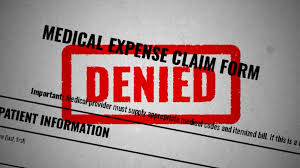
Medical Bills Denied? How to Fight Back With Insurance Law
Few things are more frustrating than opening a medical bill and seeing the dreaded words: “Claim Denied.”
You did everything right—went to an in-network doctor, got the necessary care, paid your premiums—and yet, your insurance refuses to pay.
But here’s the truth most people don’t realize: You don’t have to accept a denial.
Thanks to federal protections and state laws, you have the legal right to challenge insurance denials—and often, you can win.
This guide breaks down why claims get denied, your rights under insurance law, and how to fight back effectively when insurers say “no.”
Why Are Medical Claims Denied?
Insurance companies may deny claims for many reasons—some valid, others not. The most common include:
-
Out-of-network care
-
Lack of prior authorization
-
Services deemed “not medically necessary”
-
Missing or incorrect billing codes
-
Exceeded policy limits
But here’s the catch: Many of these denials are reversible. Insurers bank on the idea that most people won’t push back.
Your Legal Rights: What the Law Says
In the U.S., insurance is regulated at both the state and federal levels. Under the Affordable Care Act (ACA) and other laws, you have the right to:
✅ Receive an Explanation of Benefits (EOB)
This document must tell you why a claim was denied, how to appeal, and what deadlines apply.
✅ File an Internal Appeal
You can ask your insurance company to review and reconsider the denial. They must respond—typically within 30 days.
✅ Request an External Review
If your appeal is denied, you can request an independent third party (not affiliated with the insurer) to review the case. Their decision is legally binding.
✅ Get Emergency Care Covered
Under the ACA, insurers must cover ER visits—even out-of-network—without prior authorization if it’s a true emergency.
Step-by-Step: How to Fight a Denied Claim
1. Read the Denial Letter Carefully
Look for the exact reason the claim was denied. Was it missing information? Lack of pre-approval? Coding error?
2. Request a Copy of Your Policy
Your insurer must give you a full explanation of your benefits (EOB), which outlines what’s covered and under what conditions.
3. Call Your Doctor’s Billing Office
They can correct coding errors or resubmit documentation that proves the procedure was medically necessary.
4. File an Internal Appeal (In Writing)
Use the insurer’s appeal form or write a detailed letter. Include:
-
Your policy number and claim number
-
A clear statement of your appeal
-
Supporting documents (doctor’s notes, medical records, second opinions)
🕒 Deadline: Typically 180 days from the date you were notified of the denial.
5. Request an External Review (If Denied Again)
If the internal appeal fails, ask for an independent review. Your state insurance department or the federal HealthCare.gov site can help guide you.
How Often Do Appeals Work?
More than you think.
A Government Accountability Office (GAO) report found that nearly half of denied claims were overturned when consumers appealed. In some states, success rates were even higher—especially when claimants had strong documentation.
When to Get Legal Help
If your appeal is for a major surgery, chronic illness, or life-saving treatment, you may want a healthcare attorney or patient advocate involved from the start.
Also consider legal help if:
-
The denial is based on a “pre-existing condition” (which is illegal under ACA)
-
You face surprise billing from out-of-network providers in emergencies
-
The insurer fails to meet deadlines or ignores your appeals
Some nonprofits (like the Patient Advocate Foundation) offer free help for complex cases.
Pro Tips to Strengthen Your Appeal
-
Get your doctor involved. A detailed letter explaining the medical necessity of treatment can be powerful.
-
Keep everything in writing. Save all emails, letters, and notes from phone calls.
-
Know your deadlines. Missing even one can end your appeal rights.
-
Use magic words. Phrases like “urgent care,” “standard of care,” and “medical necessity” carry legal weight.
Final Thought
A denied medical bill doesn’t have to mean defeat. With the right knowledge—and a bit of persistence—you can fight back and win.
Insurance companies count on you not knowing your rights.
Now you do.
So the next time a claim is denied, don’t get mad. Get strategic.
Because insurance law is on your side—if you know how to use it.
